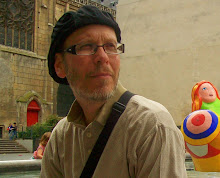"It's damn cold today. It's 39 degrees now, and rain has fallen most of the day. I woke up about 11:30 AM to the sound of thunder and rain. I wouldn't mind the wet weather if it wasn't so cold. What's going on with our weather? It's awful strange. I'm going to have to wear my heavy coat tonight, and I haven't worn it for a month now."
MANHOOD REDO: I looked online yesterday at the weather prediction for the next 10 days in Lubbock: 80s and 90s for the highs. So 39 degrees at the beginning of May was odd. But then West Texas is known for its odd weather, especially during the spring when there are typically wild fluctuations. It's a time of almost daily tornado watches and ominous thunderstorms. I've never seen more stunning lightning displays than in West Texas, where the land is so flat that the sky looms over you. One day it will be in the 90s, the next in the 60s. And the dust can kick up, billowing up miles high so that if you're outside the city you can watch a wall of dirt making its way across the landscape. It's a place of harsh extremes.
It's interesting to me to think about masculinity in connection with the the landscape, the geography of a place. Nowadays, people are so mobile, this concept might not hold much merit in anyone's mind, but I know that when I moved from Niles, Michigan to Lubbock, Texas at the age of 11, I was immediately confronted with what seemed to me to be a harsher masculinity. My first day of class, I knew that I might be in trouble when the teacher announced my name, and all the boys in the class started laughing, most of them indicating they'd never heard of anyone being named "Pat."
MANHOOD REDO: I looked online yesterday at the weather prediction for the next 10 days in Lubbock: 80s and 90s for the highs. So 39 degrees at the beginning of May was odd. But then West Texas is known for its odd weather, especially during the spring when there are typically wild fluctuations. It's a time of almost daily tornado watches and ominous thunderstorms. I've never seen more stunning lightning displays than in West Texas, where the land is so flat that the sky looms over you. One day it will be in the 90s, the next in the 60s. And the dust can kick up, billowing up miles high so that if you're outside the city you can watch a wall of dirt making its way across the landscape. It's a place of harsh extremes.
It's interesting to me to think about masculinity in connection with the the landscape, the geography of a place. Nowadays, people are so mobile, this concept might not hold much merit in anyone's mind, but I know that when I moved from Niles, Michigan to Lubbock, Texas at the age of 11, I was immediately confronted with what seemed to me to be a harsher masculinity. My first day of class, I knew that I might be in trouble when the teacher announced my name, and all the boys in the class started laughing, most of them indicating they'd never heard of anyone being named "Pat."
